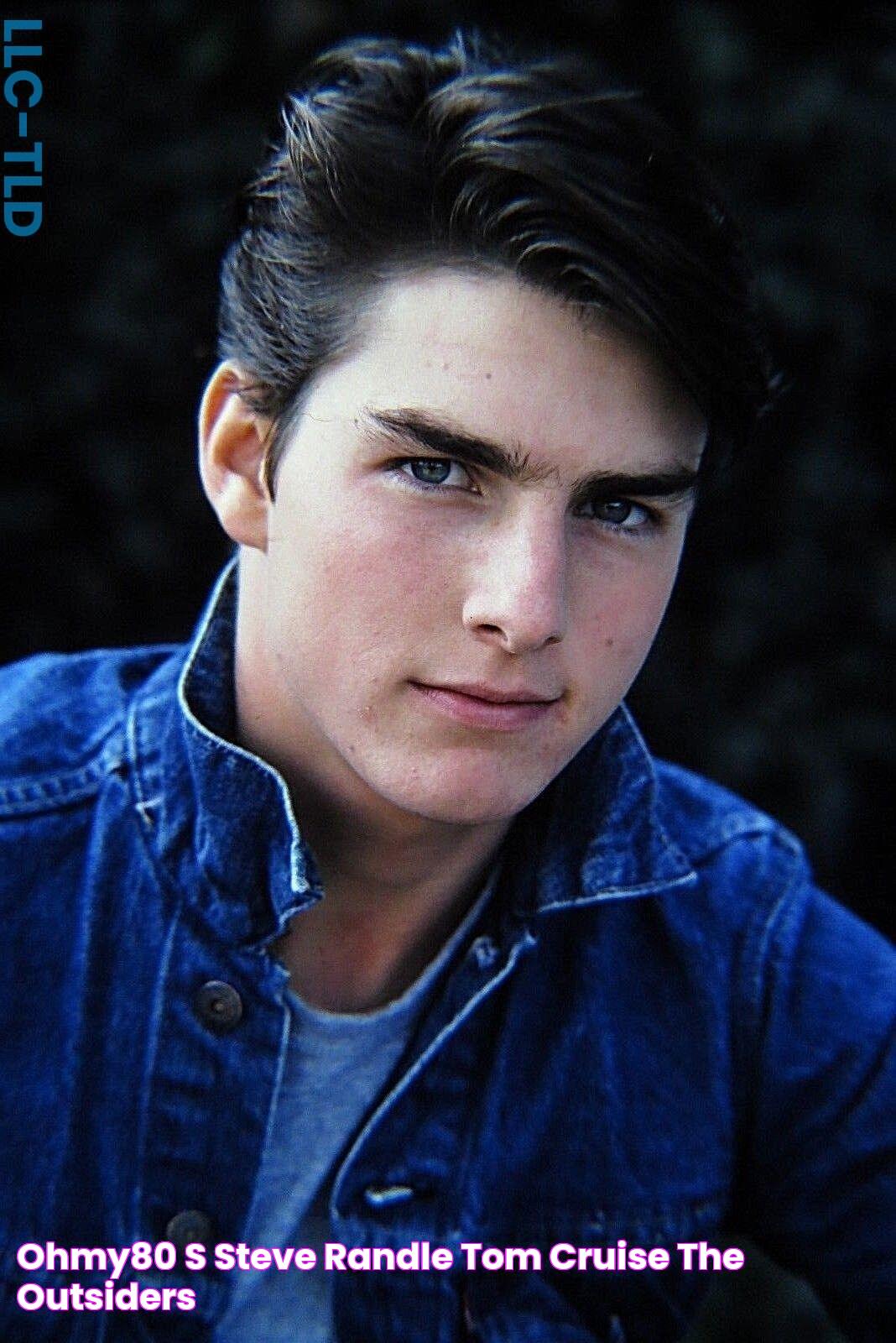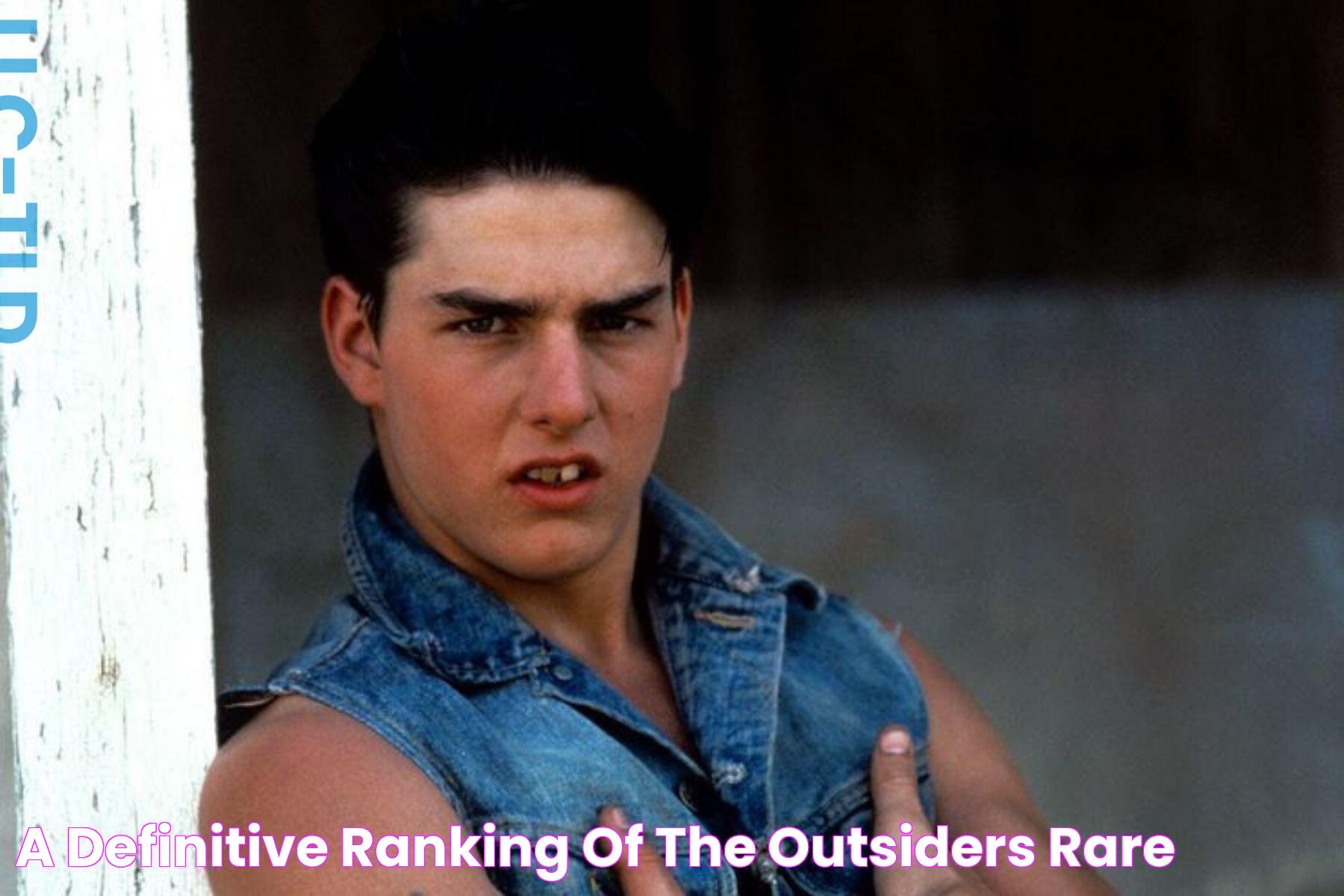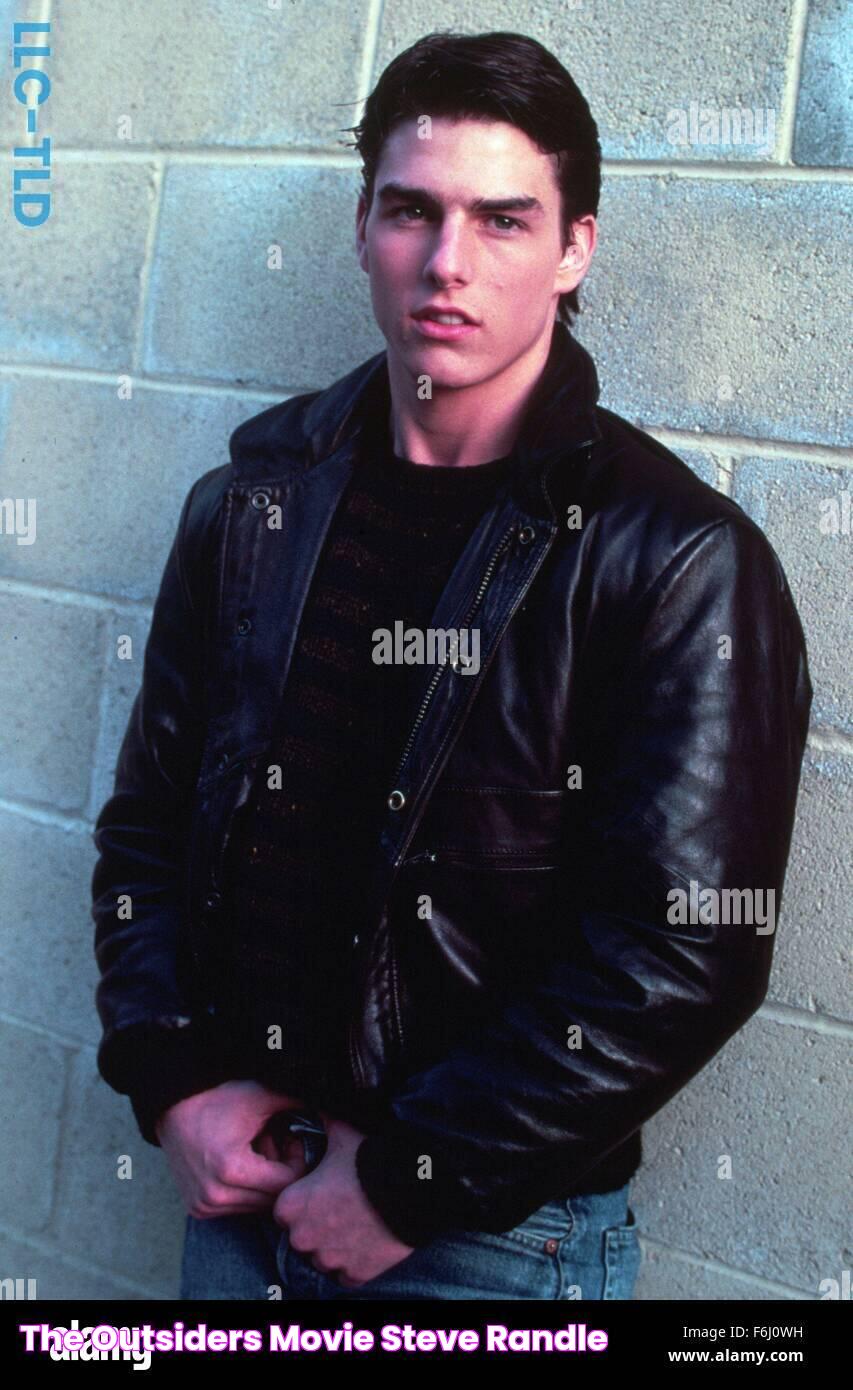Steve Randle: A Rebel With A Heart Of Gold In The Outsiders
Steve Randle, commonly referred to as "Steve" in S.E. Hinton's renowned novel "The Outsiders," is a pivotal character who embodies the struggles, loyalty, and complexities of the greaser subculture.
Steve's significance lies in his unwavering dedication to his gang, the "Greasers." Despite facing constant prejudice and hostility from the rival "Socs," Steve remains steadfast in his loyalty to his friends and the values they share. His tough exterior and rebellious nature conceal a sensitive and caring heart, making him a relatable and endearing character.
Through Steve's experiences and interactions with other characters, the novel explores themes of social inequality, the search for identity, and the power of friendship. His journey serves as a poignant reminder of the challenges faced by marginalized communities and the resilience of the human spirit in the face of adversity.
Read also:Learn More About Alyssa Cuban Dallas Mavericks Owners Wife
Steve in The Outsiders
Steve Randle, popularly known as Steve in S.E. Hinton's "The Outsiders," is a multifaceted character who represents the core themes and conflicts of the novel. Here are eight key aspects that capture his essence:
- Loyal
- Protective
- Rebellious
- Sensitive
- Marginalized
- Complex
- Admirable
- Tragic
Steve's unwavering loyalty to his fellow Greasers highlights the importance of community and belonging in the face of adversity. His protective nature, especially towards Ponyboy, showcases his compassionate side, while his rebellious spirit reflects the frustration and anger felt by marginalized groups. Steve's complexity lies in his ability to balance toughness with sensitivity, making him a relatable and sympathetic character. Despite his admirable qualities, Steve's tragic end underscores the harsh realities faced by those on the fringes of society. These key aspects collectively paint a vivid portrait of Steve Randle, a character whose significance extends beyond the pages of "The Outsiders."
1. Loyal
Loyalty is a defining characteristic of Steve Randle in S.E. Hinton's "The Outsiders." His unwavering dedication to his fellow Greasers forms the bedrock of his identity and shapes his actions throughout the novel.
Steve's loyalty manifests in his fierce protectiveness of his friends. He is always ready to defend them against threats, both physical and emotional. This loyalty extends beyond his gang members to include Ponyboy, a younger boy whom Steve takes under his wing. Steve's willingness to put himself in harm's way for those he cares about highlights the depth of his commitment.
The importance of loyalty in Steve's character cannot be overstated. It serves as a moral compass, guiding his decisions and shaping his relationships. In a world where the Greasers are constantly facing adversity, loyalty provides a sense of stability and belonging. Steve's unwavering loyalty serves as a reminder of the power of human connection and the importance of standing by one's principles.
2. Protective
Steve Randle's protective nature is an integral part of his character in S.E. Hinton's "The Outsiders." His fierce loyalty to his fellow Greasers extends beyond mere camaraderie; he is always ready to defend them against threats, both physical and emotional.
Read also:Liberty Mutual Auto Insurance Get The Coverage You Need
Steve's protectiveness stems from a deep sense of responsibility towards his friends and a recognition of the challenges they face as marginalized members of society. He understands the importance of unity and support in the face of adversity, and he is willing to put himself in harm's way to ensure their safety and well-being.
One of the most notable examples of Steve's protectiveness is his unwavering support for Ponyboy Curtis, a younger boy who becomes a target of the rival Socs. Despite the risks involved, Steve takes Ponyboy under his wing and becomes his mentor and guardian. His willingness to stand up for Ponyboy, even against overwhelming odds, highlights the depth of his commitment to his friends.
Steve's protective nature serves as a reminder of the importance of looking out for those who are vulnerable or marginalized. It underscores the power of human connection and the responsibility we have to support one another, especially in the face of adversity.
3. Rebellious
Steve Randle's rebellious nature is a defining characteristic in S.E. Hinton's "The Outsiders." His defiance of societal norms and authority figures highlights the struggles faced by marginalized groups and the search for identity.
- Rejection of Societal Norms
Steve's rebellion manifests in his rejection of the social hierarchies and expectations imposed by the wealthier "Socs." He and his fellow Greasers challenge the status quo, refusing to conform to the norms that perpetuate inequality.
- Defiance of Authority
Steve's rebellious spirit extends to his interactions with authority figures. He openly defies adults, such as teachers and police officers, whom he perceives as oppressive and unjust. This defiance stems from his frustration with the system that often fails to protect or understand the struggles of the Greasers.
- Search for Identity
Steve's rebellion is also a reflection of his search for identity. As a member of a marginalized group, he struggles to find a sense of belonging and self-worth. His rebellious actions become a way for him to assert his individuality and reject the labels society has placed upon him.
Steve's rebellious nature serves as a reminder of the challenges faced by those who are marginalized and disenfranchised. It highlights the importance of individuality, self-expression, and the search for a place where one truly belongs.
4. Sensitive
Steve Randle, despite his tough exterior and rebellious nature, possesses a hidden sensitivity that adds depth and complexity to his character in S.E. Hinton's "The Outsiders." This sensitivity manifests in various facets:
- Emotional Intelligence
Steve demonstrates a high level of emotional intelligence, often understanding and empathizing with the emotions of others. He is particularly attuned to the feelings of his fellow Greasers and is always willing to offer support and comfort.
- Vulnerability
While Steve presents a tough facade, he is not afraid to show his vulnerability. He shares his fears, doubts, and insecurities with his close friends, revealing a softer side that contrasts with his rebellious exterior.
- Artistic Appreciation
Steve has a deep appreciation for art, particularly music and literature. He finds solace and inspiration in creative expression, which allows him to escape the harsh realities of his life.
- Compassion for Others
Beneath Steve's tough exterior lies a compassionate heart. He cares deeply for his friends and family, and he is always willing to help those in need, even if it puts him at risk.
Steve's sensitivity humanizes his character and highlights the complexities of the Greasers. It challenges the stereotype of the cold and heartless juvenile delinquent, revealing the emotional depth and resilience that often lie beneath the surface.
5. Marginalized
In S.E. Hinton's "The Outsiders," Steve Randle's identity as a marginalized individual significantly shapes his character and experiences. Marginalization refers to the social exclusion and discrimination faced by certain groups based on factors such as race, socioeconomic status, or group affiliation.
Steve, as a member of the Greasers, a lower-class gang, experiences the harsh realities of marginalization firsthand. The Greasers are often stereotyped, feared, and mistreated by the wealthier "Socs" and society at large. Steve's marginalized status influences his worldview, leading him to develop a sense of alienation and distrust towards those outside his group.
The marginalization Steve faces has profound effects on his life. It limits his opportunities, restricts his access to resources, and perpetuates a cycle of poverty and social inequality. However, it also fosters a strong sense of community and loyalty among the Greasers, who find solace and support in their shared experiences.
Steve's character highlights the challenges and resilience of marginalized individuals. His journey serves as a reminder of the importance of empathy, understanding, and social justice in creating a more inclusive and equitable society.
6. Complex
Steve Randle's character in S.E. Hinton's "The Outsiders" embodies complexity, reflecting the multifaceted nature of human beings and the social dynamics of marginalized communities. Steve's complexity manifests in various ways, shaping his interactions, motivations, and experiences throughout the novel.
One key aspect of Steve's complexity lies in his duality. He presents a tough and rebellious exterior, often engaging in confrontations and defying authority figures. However, beneath this facade lies a sensitive and compassionate heart. Steve's ability to balance these contrasting traits highlights the complexity of his personality and the internal struggles he faces.
Furthermore, Steve's complexity stems from his experiences as a marginalized individual. As a member of the Greasers, he faces discrimination, prejudice, and limited opportunities. These experiences shape his worldview and contribute to his rebellious nature. Yet, amidst the challenges, Steve maintains a strong sense of loyalty and protectiveness towards his fellow Greasers, demonstrating the resilience and community found within marginalized groups.
Understanding the complexity of Steve's character provides insights into the nuances of human behavior and the impact of social factors on individual development. It challenges simplistic stereotypes and highlights the importance of empathy and understanding in fostering inclusive and just societies.
7. Admirable
Steve Randle, a pivotal character in S.E. Hinton's "The Outsiders," embodies admirable qualities amidst the complexities of his life and the challenges he faces as a member of the marginalized Greasers. His admirable traits are multifaceted and speak to the human capacity for resilience, loyalty, and compassion.
- Unwavering Loyalty
Steve's loyalty to his fellow Greasers is unwavering. He fiercely protects and supports his friends, demonstrating a strong moral compass and commitment to the bonds of community. His loyalty extends beyond his gang, as seen in his protective nature towards Ponyboy, a younger boy who becomes a target of the rival Socs.
- Courage in the Face of Adversity
Despite the hardships and prejudices faced by the Greasers, Steve exhibits remarkable courage in standing up for what he believes in. He confronts the Socs, a wealthier and more privileged gang, to defend his friends and protect his community. His courage serves as an inspiration to others, showing that even in the face of adversity, it is possible to fight for what is right.
- Compassion for the Vulnerable
Beneath Steve's tough exterior lies a compassionate heart. He cares deeply for his friends and family, and he is always willing to help those in need. His compassion is particularly evident in his relationship with Ponyboy, whom he takes under his wing and guides through difficult times.
- Resilience and Strength
In the face of societal challenges and personal struggles, Steve exhibits extraordinary resilience and strength. He refuses to let his circumstances define him, and he maintains a positive outlook despite the hardships he faces. His resilience serves as a reminder of the human capacity to overcome adversity and find hope in even the darkest times.
Steve Randle's admirable qualities make him a compelling and relatable character. His unwavering loyalty, courage, compassion, and resilience inspire readers to reflect on the importance of these virtues in their own lives. Through Steve's journey, "The Outsiders" highlights the strength and resilience of marginalized communities and the enduring power of human connection.
8. Tragic
The character of Steve Randle in S.E. Hinton's "The Outsiders" embodies several tragic elements that contribute to the novel's poignant exploration of loss, societal inequality, and the struggles faced by marginalized communities.
- Untimely Death
Steve's untimely death in a senseless act of violence serves as a stark reminder of the fragility of life and the devastating consequences that can result from societal divisions and prejudice. His tragic end highlights the novel's central themes of loss and the profound impact it has on the lives of those left behind.
- Missed Potential
Steve's death represents a tragic loss of potential. As a bright and charismatic young man, he had the potential to break free from the cycle of poverty and violence that plagued his community. His untimely demise underscores the tragic waste of human potential that can occur due to societal barriers and lack of opportunities.
- Symbol of Marginalization
Steve's tragic fate serves as a powerful symbol of the marginalization and oppression faced by the working-class Greasers. His death exposes the deep-seated inequalities and prejudices that exist within society, highlighting the tragic consequences of systemic discrimination.
- Missed Chance for Redemption
Steve's tragic end also represents a missed opportunity for redemption. As the novel progresses, Steve begins to question his involvement in the gang and expresses a desire to change his life. However, his untimely death cuts short any chance for him to break free from the cycle of violence and find a better path.
In conclusion, the tragic elements surrounding Steve Randle's character in "The Outsiders" serve to emphasize the novel's exploration of loss, societal inequality, and the devastating impact of marginalization. Steve's untimely death, missed potential, and status as a symbol of oppression highlight the profound struggles faced by marginalized communities and the tragic consequences that can result from systemic prejudice and lack of opportunity.
Frequently Asked Questions on "Steve in The Outsiders"
This section addresses common concerns or misconceptions surrounding Steve Randle, a prominent character in S.E. Hinton's novel "The Outsiders."
Question 1: What is Steve's significance in "The Outsiders"?
Steve embodies the complexities faced by marginalized communities and the strength of friendship amidst adversity. His loyalty, rebellious nature, and sensitivity highlight the human capacity for resilience and compassion in challenging circumstances.
Question 2: How does Steve's character challenge societal norms?
Steve's defiance of societal expectations and authority figures reflects the frustrations and search for identity prevalent among marginalized groups. His rebellious actions question the established social hierarchies and highlight the need for inclusivity and understanding.
Question 3: In what ways does Steve's sensitivity add depth to his character?
Steve's sensitivity humanizes his otherwise tough exterior. His emotional intelligence, vulnerability, and appreciation for art reveal a multifaceted personality that challenges the stereotype of the cold and heartless juvenile delinquent.
Question 4: How does Steve's marginalization shape his experiences in the novel?
As a member of the Greasers, Steve faces discrimination, prejudice, and limited opportunities. These experiences foster a strong sense of community and loyalty among the Greasers, while also highlighting the challenges and resilience of marginalized individuals.
Question 5: What makes Steve an admirable character?
Steve's unwavering loyalty, courage in the face of adversity, compassion for the vulnerable, and resilience make him an admirable figure. He represents the strength and resilience of marginalized communities and inspires readers to reflect on the importance of these virtues.
Question 6: How does Steve's tragic death contribute to the novel's themes?
Steve's untimely demise underscores the novel's exploration of loss, societal inequality, and the devastating consequences of marginalization. His death symbolizes the missed potential and missed opportunities for redemption that can result from systemic discrimination.
In summary, Steve Randle is a complex and multifaceted character who embodies the struggles, strengths, and complexities of marginalized communities. His presence in "The Outsiders" highlights the importance of empathy, understanding, and social justice in creating a more inclusive and equitable society.
Transition to next article section...
Tips on Analyzing "Steve in The Outsiders"
In-depth analysis of Steve Randle's character in S.E. Hinton's "The Outsiders" can yield valuable insights into the novel's themes, social commentary, and character development. Here are some tips to guide your analysis:
Tip 1: Examine Steve's Loyalty and Protectiveness- Analyze how Steve's fierce loyalty to his fellow Greasers shapes his actions and motivations.
- Examine specific instances where Steve demonstrates his protective nature, especially towards Ponyboy.
- Consider the significance of loyalty and protectiveness in the context of marginalized communities.
- Identify the ways in which Steve's tough exterior contrasts with his inner sensitivity.
- Examine Steve's emotional intelligence, vulnerability, and appreciation for art.
- Consider how Steve's complexity challenges stereotypes and adds depth to his character.
- Examine how Steve's experiences as a marginalized individual shape his worldview and actions.
- Analyze Steve's defiance of societal norms and authority figures.
- Consider the significance of Steve's rebellious nature in the context of social inequality.
- Follow Steve's journey throughout the novel, paying attention to his evolving thoughts, feelings, and actions.
- Identify key moments that contribute to Steve's growth and development.
- Consider the significance of Steve's tragic end and its impact on the novel's themes.
- Examine how Steve's character embodies the novel's central themes, such as social inequality, the search for identity, and the power of friendship.
- Analyze how Steve's experiences and relationships contribute to the novel's exploration of these themes.
- Consider the broader implications of Steve's character and his role in the novel's social commentary.
By following these tips, you can gain a deeper understanding of Steve Randle's character and his significance in "The Outsiders." A thorough analysis of Steve's complexities, motivations, and experiences will enrich your appreciation of the novel's themes and provide valuable insights into the challenges and resilience of marginalized communities.
Transition to the article's conclusion...
Conclusion
In S.E. Hinton's "The Outsiders," Steve Randle emerges as a complex and pivotal character who embodies the struggles, strengths, and complexities of marginalized communities. Through his unwavering loyalty, rebellious spirit, and hidden sensitivity, Steve challenges societal norms and highlights the enduring power of friendship amidst adversity.
Steve's character serves as a poignant reminder of the challenges faced by those on the fringes of society. His tragic end underscores the missed potential and missed opportunities for redemption that can result from systemic discrimination. Yet, Steve's resilience and compassion also inspire hope, reminding us of the indomitable spirit that resides within marginalized communities.
The exploration of "steve in the outsiders" invites us to reflect on the importance of empathy, understanding, and social justice in creating a more inclusive and equitable society. Steve's character continues to resonate with readers today, reminding us of the power of friendship, the resilience of the human spirit, and the urgent need to address the challenges faced by marginalized communities.
Explore The Life And Impact Of Actress Eden Rebecca Sher
Steve Randle: A Rebel With A Heart Of Gold In The Outsiders
Subhshree Sahu: A Renowned Name In The Fashion Industry


